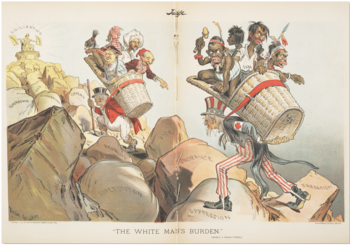
In this cartoon from Judge Magazine, 1 April 1897, The British John Bull and the American Uncle Sam are depicted bearing ‘The White Man’s Burden’, taking the non-white peoples of the world to civilization.
In this learning pathway you will explore the impact of imperialism in the nineteenth and early twentieth centuries. Imperialists, influenced by ideologies such as Social Darwinism, viewed indigenous peoples in Africa, Asia and Oceania as primitive and uncivilized. They justified colonization and its accompanying oppression as missions to civilize these ‘backward’ peoples. These racist attitudes meant that indigenous peoples were widely regarded as inferior. Imperialism occurred not only through colonization, but in economic and cultural spheres as well.
During this learning pathway you will watch/listen to one lecture, examine two primary source documents, and complete two readings.
- Understand the ideology of Social Darwinism
- Explore the consequences of imperialism on native peoples
- Examine different forms of cultural imperialism
In this learning pathway you will explore the impact of imperialism in the nineteenth and early twentieth centuries. Imperialists, influenced by ideologies such as Social Darwinism, viewed indigenous peoples in Africa, Asia and Oceania as primitive and uncivilized. They justified colonization and its accompanying oppression as missions to civilize these ‘backward’ peoples. These racist attitudes meant that indigenous peoples were widely regarded as inferior. Imperialism occurred not only through colonization, but in economic and cultural spheres as well.
During this learning pathway you will watch/listen to one lecture, examine two primary source documents, and complete two readings.
Objectives
Content is available under the
Creative Commons Attribution Share Alike License.
Privacy Policy | Authors